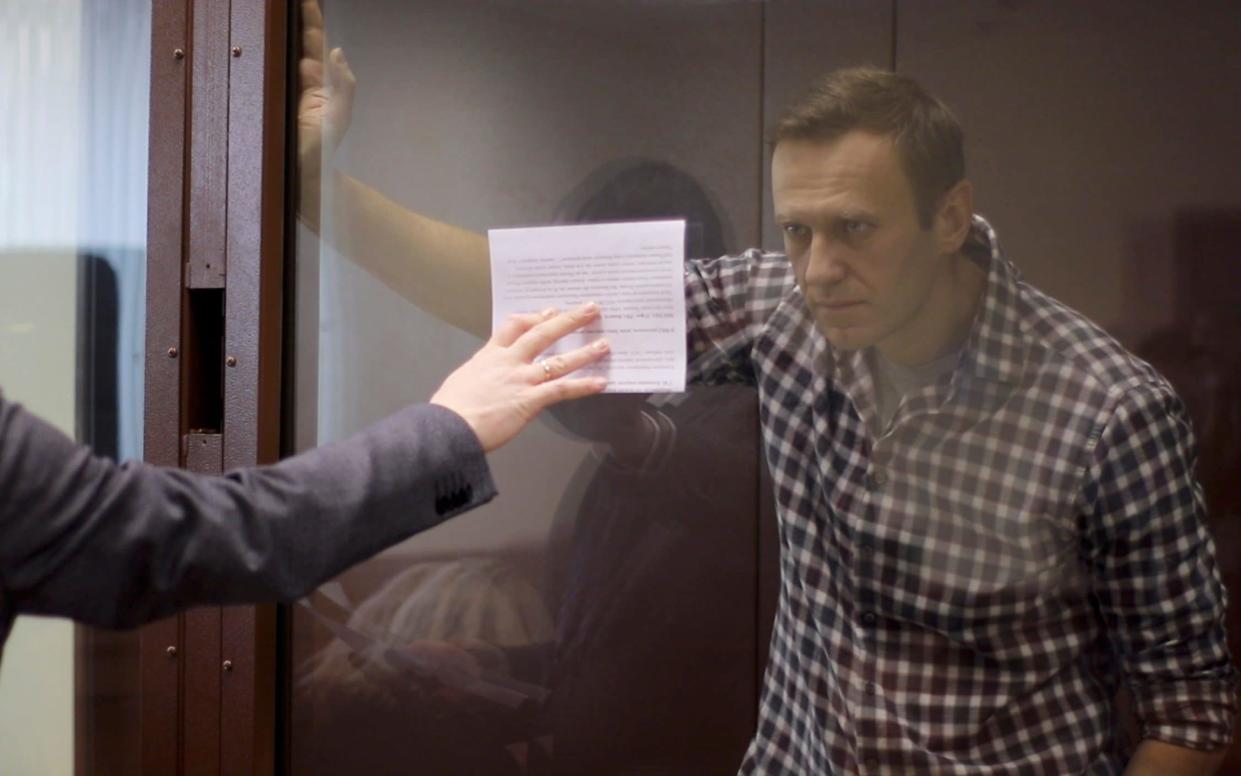EU to impose sanctions against Russia for jailing opposition leader Alexei Navalny

- Oops!Something went wrong.Please try again later.
The European Union will impose sanctions against Russia for the jailing of opposition leader Alexei Navalny, one of Vladimir Putin's most vocal critics.
Josep Borrell, the head of the EU's foreign affairs service, said that "political agreement" on the need for sanctions was reached among the 27 foreign affairs ministers of the EU at a meeting in Brussels on Monday.
The bloc will use the “EU Magnitsky Act”, which allows sanctions to be imposed for human rights abuses, for the first time, he said.
In response, Russia's foreign ministry said the EU's decision was "disappointing" and called it "a far-fetched pretext to prepare new unlawful unilateral restrictions on Russian citizens".
After the Foreign Affairs Council in Brussels, Mr Borrell said: "There is a shared assessment in the Council that Russia is drifting towards an authoritarian state."
The EU's chief diplomat said he hoped the work on the sanctions, which will target people involved "in the detaining and persecution of Mr Navalny" would be completed within a week.
"There is a shared assessment in the council that Russia is drifting towards an authoritarian state," Mr Borrell said after a meeting of the EU's Foreign Affairs Council in Brussels.
"In response to events around the situation of Mr Navalny, we reached a political agreement to impose restrictive measures against those responsible for his arrest and sentencing, and prosecution for doing that," he said.
He added: "For the first time ever we will make use of the European Union global human rights regime. To this end the sanctions will be put in the pipeline of our administrative process.
"Maybe it will take one week and I hope not more than that," he added, suggesting it would be signed off by a written procedure.
Mr Borrell is expected to propose four names for the sanctions but that number could be increased by member states. He refused to name the officials being targeted by the travel bans and asset freezes.
EU diplomats said Alexander Bastrykin, whose Investigative Committee handles major crimes and reports directly to Mr Putin, was on the list. He is already under British human rights sanctions.
Igor Krasnov, Russia’s prosecutor-general, Viktor Zolotov, the head of the National Guard and Alexander Kalashnikov, the head of the federal prison service, are also on the list, Reuters reported.
Mr Navalny’s allies had called on the EU to target Putin-allied oligarchs with sanctions but the new measures fall short of that.
In November last year, Mr Navalny told the European Parliament that the Kremlin would never take EU sanctions seriously as long as the yachts of Russia’s super-rich were moored in European cities such as Barcelona and Monaco.
Mr Borrell said that the EU was only able to legally target sanctions at those directly involved in the events requiring punishment, which meant hitting the oligarchs was not possible in this case.
He told reporters that the EU had agreed a three-pronged strategy when dealing with Moscow, which has expelled diplomats from Germany, Poland and Sweden for observing protests in Russia against Mr Navalny’s arrest.
The strategy involved pushback when Russia infringed international law and human rights, containment when Russia used disinformation and cyber warfare against the EU and engagement on areas of mutual interest.

Mr Borrell was forced to defend himself after a disastrous trip to Moscow in early February ended in failure to even meet Mr Navalny let alone secure his release. The humiliation was compounded by the expulsion of the diplomats during the visit.
The EU hit six senior Russian officials with asset freezes and visa bans in October over the poisoning of Mr Navalny with a nerve agent. Mr Navalny blames Vladimir Putin for the chemical weapons attack.
He was jailed for three and a half years on his return to Russia after narrowly surviving the attempt on his life. A court rejected his appeal against his sentence last week.
Vladimir Chizhov, Russia’s ambassador to the EU, said that Russia would be “ready to respond” to any sanctions from Brussels, which he characterised as “illegitimate”.
New US Secretary of State Antony Blinken spoke to the gathered EU foreign ministers in the meeting on Monday. He condemned the chemical weapons attack on Mr Navalny.
Mr Borrell said he was "reasonably optimistic" about the prospects of EU-hosted talks with Tehran about the US returning to the Iran nuclear deal.
He said he hoped there would be news "in the next days" over the efforts to revive Washington's involvement in the agreement.

